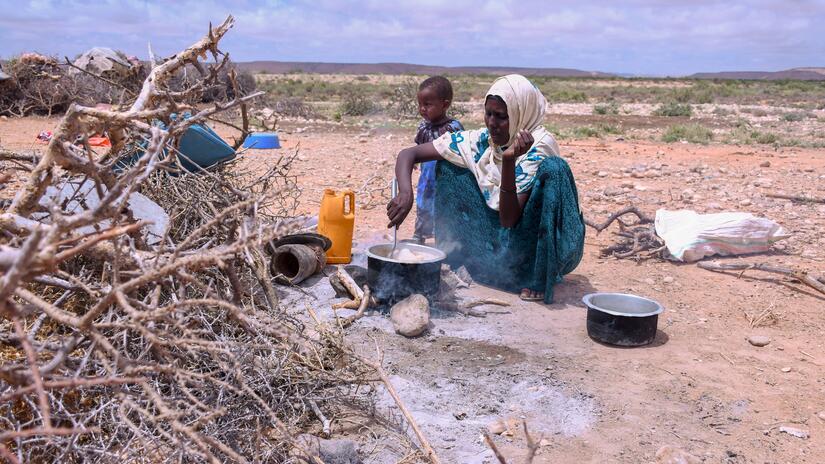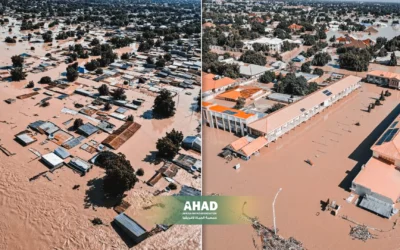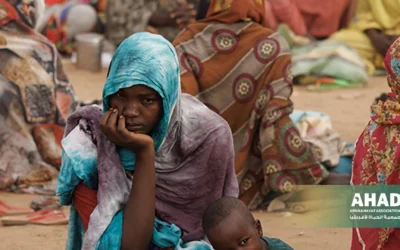The worsening hunger crisis in Africa
Africa, a continent promising natural riches, however, faces enormous challenges in the field of food security and hunger. Millions of Africans suffer from severe nutritional deficiencies, which affects their lives and threatens the stability of states in the region. This problem is caused by multiple and cumulative causes, including climate change, armed conflicts, extreme poverty, and lack of agricultural infrastructure. In this article, we will discuss in depth the causes of the worsening hunger crisis in Africa and the devastating effects that result from it.
The causes of the worsening hunger crisis in Africa:
The worsening of the hunger crisis in Africa is the result of the interaction of multiple and interrelated causes, which include climate change, lack of agricultural infrastructure, rapid population growth, armed conflicts, poverty and social marginalization. I will explain each of these reasons in detail:
1. Climate change and unstable weather
Climate change is one of the most important factors exacerbating hunger in Africa. The main effects include:
– High temperatures increase the evaporation of water from soils and crops, which reduces their productivity.
– The interruption of rain leads to a lack of water necessary for agriculture and cattle breeding.
– Climatic phenomena such as desertification and agricultural erosion lead to the loss of arable land.
2. Lack of agricultural infrastructure
– Many countries suffer from a lack of agricultural irrigation infrastructure, which reduces the ability of farmers to increase their productivity.
– Countries lack modern agricultural technologies and practices that can increase the efficiency of agricultural production.
– Many farmers suffer from a lack of training in the use of modern technologies and sustainable practices.
3. Rapid population growth
– The population in Africa is growing at a rapid rate, increasing pressures on natural resources such as agricultural land and water.
– Rapid population growth leads to an increased demand for food, which makes it difficult to meet the needs of the population.
4. Armed conflicts and political instability
– Armed conflict leads to the displacement of the population and the destruction of agricultural infrastructure, which makes it difficult to obtain food.
– Political instability hinders the ability of governments to provide food aid and economic development.
5. Poverty and social marginalization
– Many residents live in extreme poverty, which prevents them from being able to get adequate food.
– Vulnerable groups do not enjoy social protection systems that ensure the provision of basic food.
The worsening hunger crisis in Africa is a huge challenge that requires a comprehensive and integrated response from local governments and the international community. We have to work collectively to fight poverty and climate change, improve agricultural infrastructure, enhance food security to reduce hunger and achieve sustainable development on the African continent.

The devastating effects of the worsening hunger crisis in Africa:
Increased mortality and morbidity:
Increased mortality and morbidity rates are one of the most important negative consequences of hunger in Africa. Children and adults are most susceptible to acute nutritional deficiencies, which leads to:
Increased mortality rates due to malnutrition many children and adults die due to undernutrition, especially infants.
Increased morbidity undernourished individuals develop diseases such as immunodeficiency and infectious diseases more often, which increases the incidence and mortality rates.
Deterioration of the economic and social situation
Hunger leads to a deterioration in the economic and social situation of individuals and communities in Africa, due to:
– Hungry individuals have less energy and productivity, which negatively affects the local economy.
– Hunger pushes individuals into extreme poverty, making them unable to buy food and meet their basic needs.
– Hunger leads to social unrest, such as high crime and violence, as a result of a sense of frustration and dissatisfaction.
Increased migration and displacement
Hunger forces individuals to seek better life conditions, which leads to:
– They migrate to more stable areas within countries or even outside the continent in search of better opportunities to live.
– Extreme conditions and Hunger Force individuals to be forcibly displaced, increasing pressure on host countries and exacerbating humanitarian crises.
Negative psychological and psychological effects:
Hunger leaves serious psychological and psychological effects on individuals and societies, such as:
– Individuals affected by hunger live in poor psychological and psychological states due to constant anxiety for food and their future.
– Individuals find it difficult to stay optimistic, continue to work and study due to hunger and lack of nutrition.
– Hunger affects individuals ‘ ability to learn and personal development, reducing their chances of getting better job opportunities.
The worsening hunger crisis in Africa has devastating effects on individuals and communities, requiring a rapid and effective response to reduce hunger and achieve food security. We have to work on improving agricultural infrastructure, combating climate change, enhancing food security, and promoting economic and social stability. With joint cooperation and political will, we can achieve real progress in the fight against hunger and achieve sustainable development in Africa.

Addressing the worsening hunger crisis in Africa, causes, impacts, and possible solutions
To combat the worsening hunger crisis in Africa, here are some possible solutions that can be taken:
1. Increased investment in agricultural infrastructure and irrigation:
– Investment in agricultural infrastructure such as agricultural irrigation and advanced agricultural technologies should be increased. This includes providing efficient and sustainable irrigation systems that reduce water wastage.
– Technologies such as hydroponics, smart farming, efficient use of fertilizers and pesticides can increase the productivity of farmers and improve the quality of crops.
2. Enhancing food security and developing agricultural skills:
– This includes the provision of basic food and nutrients to the most vulnerable groups, ensuring their sustainable availability.
– Technical training of farmers on the use of modern technologies and sustainable practices should be strengthened to increase their productivity and resistance to climate changes.
3. Adaptation to climate change and environmental sustainability:
– Strategies to adapt to climate change must be developed and implemented, such as effectively managing water resources and developing drought-resistant agricultural systems.
– Agricultural lands and natural water resources should be protected from pollution and desertification, and the sustainable use of Natural Resources should be promoted.
4. Conflict resolution and political stabilization:
– Armed conflicts must be resolved and political stability must be strengthened to facilitate humanitarian access and improve economic conditions.
– Food security and social protection should be achieved for conflict-affected communities to enable them to recover and develop.
5. Promotion of education and social protection:
– Agricultural and technical education of young people and farmers should be strengthened, providing basic education and skills to enable them to improve their chances in life.
– National social protection systems for the most vulnerable groups should be strengthened, including direct and joint support to improve the daily life of those in need.
Combating the worsening hunger crisis in Africa requires integrated efforts and strong international cooperation. By increasing investment in agricultural infrastructure, enhancing food security, adapting to climate change, resolving conflicts, strengthening education and social protection, we can achieve real progress towards eradicating hunger and promoting sustainable development in Africa.
Ahad’s efforts to improve the lives of the poor and disadvantaged in central and West Africa
AHAD works in the heart of the African continent, with a special focus on the countries of Central and West Africa, with the aim of improving the quality of life of the poor and disadvantaged in those regions. AHAD adopts a comprehensive approach in its projects, including the areas of health, education, water, and economic development, to achieve sustainable development that enhances the capabilities of local communities.
Community-friendly strategies
AHAD recognizes the unique nature of the communities it works with, and chooses strategies that match the skills and abilities of the residents of these communities. AHAD seeks to enhance their participation and empowerment, to ensure that they have an effective role in building their communities. By focusing on leveraging local capabilities, AHAD enhances the impact of its projects and ensures their long-term sustainability.
Improving health services
AHAD pays great attention to improving health services and providing basic health care. Its efforts include the construction and equipping of health facilities, the provision of necessary medicines, and the organization of health awareness campaigns. These efforts are aimed at reducing mortality and morbidity rates, especially among children and women.
Supporting education as a pillar of sustainable development
AHAD considers education a fundamental pillar of sustainable development. The organization is engaged in the construction and equipping of schools, the provision of educational materials, the training of teachers. AHAD strives to improve the quality of education and ensure that children have equal access to educational opportunities, enabling them to build a better future.
Provision of clean water and sanitation
AHAD’s projects to provide clean water and sanitation include drilling wells, building water distribution systems, and educating communities about the importance of Hygiene and public health. These efforts contribute to improving public health and reducing waterborne diseases.
Economic empowerment
AHAD seeks to empower individuals economically by offering vocational training, supporting small businesses, and providing job opportunities. These efforts are aimed at strengthening the local economy and creating productive and sustainable communities.
Commitment to the realization of the motto “because she deserves life”
Ahad relies on the motto “because it’s worth living”, and works hard to realize this motto in every project she does. The organization aims to make a tangible positive impact in the life of the communities it serves, by providing basic needs, improving the quality of education, and empowering individuals to participate effectively in building their communities.
You can visit the AHAD website to find out more about the projects it offers
ALSO READ
WHAT THE FOOD BASKET CONTAINS IN AHAD
Join us in our message




